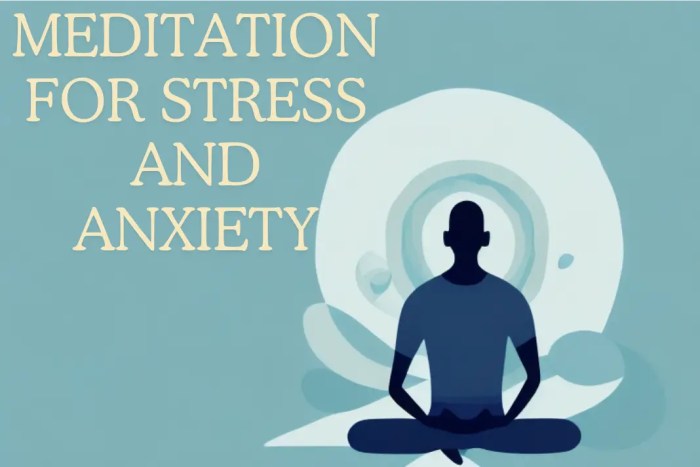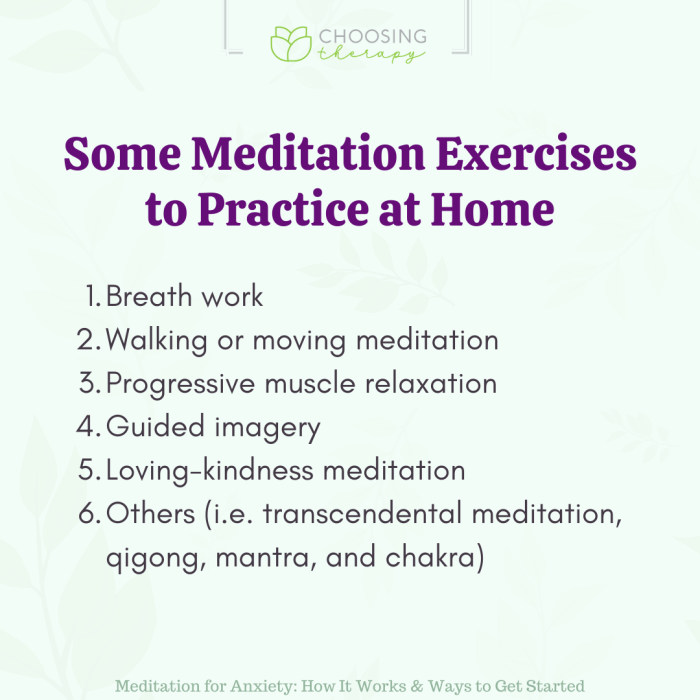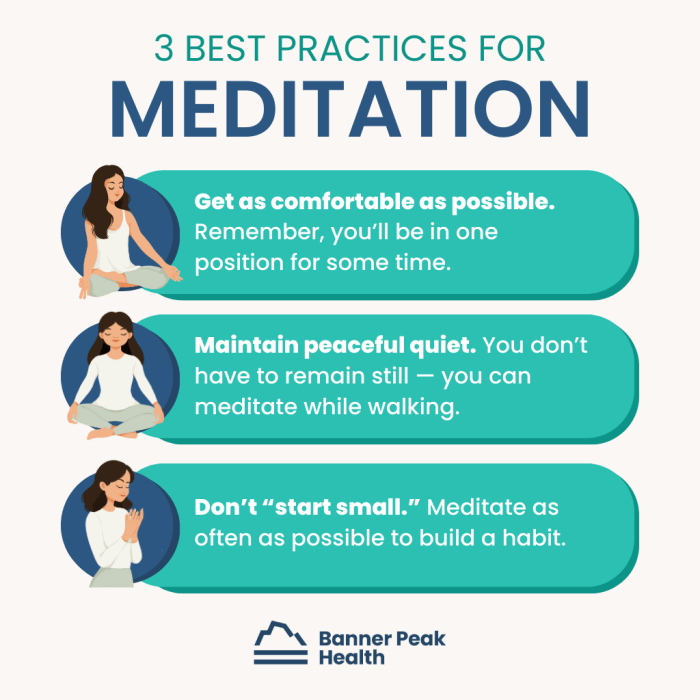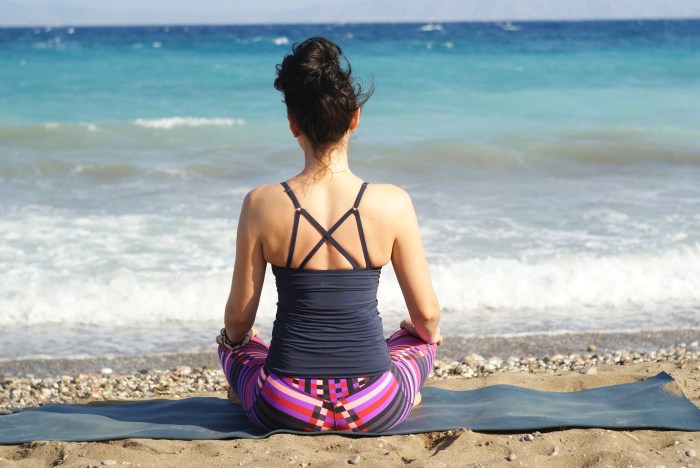How to Meditate for Dealing with Stress and Anxiety Naturally sets the stage for this enthralling narrative, offering readers a glimpse into a story that is rich in detail with dream author style and brimming with originality from the outset.
Embark on a journey of self-discovery and tranquility as we delve into the art of meditation and its profound impact on stress and anxiety management.
Benefits of Meditation for Stress and Anxiety: How To Meditate For Dealing With Stress And Anxiety Naturally

Meditation has been proven to be a powerful tool in naturally reducing stress and anxiety levels. By incorporating meditation into your daily routine, you can experience a wide range of benefits that contribute to your overall mental well-being.
Welcome back, now let’s explore the benefits of a 5-minute meditation to boost productivity. If you’re looking for a quick and effective way to enhance your focus and efficiency, be sure to try out this helpful meditation session at 5-Minute Meditation to Boost Your Productivity. It’s a game-changer for busy individuals striving for peak performance.
Reduction in Stress Levels
- Meditation helps calm the mind and body, reducing the production of stress hormones like cortisol.
- Regular practice of meditation can lead to lower perceived stress levels and an improved sense of well-being.
- Individuals who meditate often report feeling more relaxed and at ease in stressful situations.
Decrease in Anxiety Symptoms
- Mindfulness meditation techniques can help individuals manage symptoms of anxiety disorders.
- Studies have shown that meditation can reduce anxiety levels by promoting a sense of inner peace and tranquility.
- By focusing on the present moment through meditation, individuals can alleviate feelings of worry and unease.
Scientific Research Findings, How to Meditate for Dealing with Stress and Anxiety Naturally
- A study published in JAMA Internal Medicine found that mindfulness meditation programs can improve anxiety, depression, and pain levels.
- Research conducted at Johns Hopkins University suggests that meditation can have a moderate effect on reducing symptoms of anxiety, depression, and pain.
- Neuroimaging studies have shown that meditation can lead to changes in brain regions associated with stress and anxiety regulation.
Types of Meditation Techniques

When it comes to managing stress and anxiety, different types of meditation techniques can be beneficial. Let’s explore mindfulness meditation, loving-kindness meditation, and transcendental meditation to understand how each can help in dealing with these issues.
Thank you for joining us today. Let’s dive into the topic of meditation for greater relaxation and peace. For those seeking tranquility and inner calm, check out this informative guide on How to Meditate for Greater Relaxation and Peace. It provides valuable insights and techniques to help you achieve a more peaceful state of mind.
Mindfulness Meditation
- Mindfulness meditation involves focusing on the present moment without judgment.
- Practitioners are encouraged to observe their thoughts and feelings without getting caught up in them.
- Benefits include increased self-awareness, emotional regulation, and stress reduction.
Loving-Kindness Meditation
- Loving-kindness meditation focuses on developing feelings of compassion and love towards oneself and others.
- Practitioners repeat phrases of well wishes for themselves and others, fostering positive emotions.
- Benefits include improved self-esteem, empathy, and a sense of connection with others.
Transcendental Meditation
- Transcendental meditation involves silently repeating a mantra to achieve a state of relaxed awareness.
- Practitioners aim to transcend their current state of consciousness and reach a deeper level of relaxation.
- Benefits include reduced stress, improved focus, and better overall well-being.
How to Start Meditating

Starting a meditation practice for stress relief can be a powerful tool in managing anxiety and finding inner peace. Here is a step-by-step guide to help you begin your meditation journey:
Create a Peaceful Meditation Space at Home
Creating a peaceful meditation space at home is essential for establishing a consistent practice. Here are some tips to help you set up your meditation space:
- Choose a quiet and clutter-free area where you won’t be disturbed.
- Add elements that promote relaxation, such as candles, cushions, or plants.
- Consider playing soft music or nature sounds to enhance the calming atmosphere.
- Ensure proper lighting and ventilation to create a comfortable environment.
Importance of Consistency and Setting Realistic Goals
Consistency is key when starting a meditation routine. Here are some tips to help you stay on track and make meditation a regular part of your day:
- Start with short sessions, such as 5-10 minutes, and gradually increase the duration as you become more comfortable.
- Choose a specific time of day to meditate, whether it’s in the morning, during lunch break, or before bed.
- Set realistic goals for your meditation practice, focusing on progress rather than perfection.
- Acknowledge any distractions or wandering thoughts during meditation without judgment, and gently guide your focus back to your breath or mantra.
Breathing Techniques for Stress Relief

Breathing techniques play a crucial role in calming the mind and reducing stress. By focusing on the breath, you can bring your awareness to the present moment and create a sense of calm within yourself.
Diaphragmatic Breathing
- Diaphragmatic breathing, also known as belly breathing, involves taking deep breaths by expanding your diaphragm.
- Start by inhaling deeply through your nose, feeling your abdomen rise as you fill your lungs with air.
- Exhale slowly through your mouth, emptying your lungs completely and allowing your abdomen to fall.
- Repeat this process for several minutes to promote relaxation and reduce tension in the body.
Box Breathing
- Box breathing is a technique that involves inhaling, holding, exhaling, and holding the breath in a pattern resembling a square or box.
- Inhale deeply for a count of four, hold the breath for a count of four, exhale slowly for a count of four, and hold the breath for a count of four before repeating the cycle.
- This technique helps regulate the breath, calm the nervous system, and promote relaxation.
Incorporating Breathing Exercises into Meditation
- Integrating breathing exercises into your meditation practice can enhance its effectiveness in managing anxiety.
- By focusing on your breath during meditation, you can cultivate mindfulness, increase self-awareness, and reduce the impact of stressors on your mental well-being.
- Combining breathing techniques with meditation allows you to develop a deeper sense of calm and inner peace, improving your overall resilience to stress and anxiety.
As we conclude this exploration into the realm of meditation, may you find solace in the practice of mindfulness and breathing techniques, paving the way for a harmonious balance between mind, body, and spirit.
As we continue our discussion, let’s delve into the topic of meditation for achieving success and mental focus. To unlock your full potential and sharpen your concentration skills, be sure to explore the techniques outlined in this comprehensive guide on How to Meditate for Achieving Success and Mental Focus. It’s a must-read for those aiming for excellence in all aspects of life.